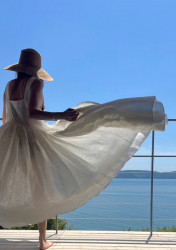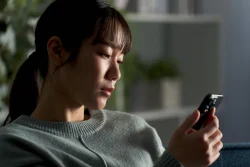
Originally published on metropolis.co.jp on November 2011

As leader of Seagull Screaming Kiss Her Kiss Her, Aiha Higurashi was—along with bands like Buffalo Daughter—part of the tide of Japanese rock that onto washed western shores in the ’90s.
As songwriter for the likes of Yuki and Nanase Aikawa, she’s also been at the heart of the J-pop scene for the last decade.
But in an interview at a Shimokitazawa café, it’s as much the local Setagaya girl made good and single mom on display, as the rock icon.
“I grew up and still live nearby,” says Higurashi (pictured right), explaining her choice of interview location. “I used to go out to punk shows in
Shimokitazawa but it was very underground at the time,” she continues when asked about coming of age in the counterculture hub. “When I was in high school in the ’80s nobody listened to punk. But people were friendly, maybe because I was weird. They would ask me about my clothes, but in a nice way.”
A quick web search reveals the various stages of Higurashi’s career: after a decade with Seagull, she went solo and then formed the groups Ravolta and Loves, before creating her latest band, The Girl.
Seagull Screaming Kiss Her Kiss Her are often described as a New York band, and experienced some of their best success Stateside, but Higurashi says they formed in Tokyo. It’s her time as a student at NYU that led to the confusion—and her fluent English ability.
These days Higurashi seems to have found a sweet spot for herself. She’s brimming with excitement about her new band and seems to be a bit of an icon for single moms as well, writing about her experiences with characteristic bluntness on her blog Sky Nikki.
What there have been of rough spots along the way only add to her appeal—a blend of outspokenness and vulnerability you don’t often find in Japan. After touring the States with the likes of Yo La Tengo, Higurashi in short order married, gave birth to her daughter, divorced—and got depressed.
“Post-partum depression was really bad,” she says. “I spent a whole year curing my sickness. I was still doing interviews and shows, but when I wasn’t working I would go crazy. So my shrink said, “you shouldn’t stop, it’s your life.” I decided he was right, so I took my daughter to Fuji Rock at ten months old—my parents cared for her while I was playing. As a single mother I rely on them a lot.”
The daughter of well-known copywriter and songwriter Shinzo Higurashi, the creator of the brand name Mujirushi, Higurashi grew up in an artistic, unconventional household. Her mother told her being pregnant was “not a sickness,” and against Japanese tradition—which says to stay home—encouraged her to tour even with a tummy bump.
So it’s not surprising to see Higurashi starting a new punk band even on the cusp of turning 40. Bringing her lilting melodies and heart-on-her-sleeve lyrics together with Tabasa Hayashi’s distorted punk bass lines and Naoko Okamoto’s fevered drumming, she seems to have found a new lease in her musical life.
“The members of Loves are great people but they were too good for me,” she says about her reasons for starting The Girl. “I thought that if I played with skilled musicians it would free me up, but it didn’t work out that way. I wanted to find out again what I could do on my own.”
The Girl’s debut album Lost in wonder is a raw affair that recalls Sonic Youth or the Breeders, in comparison to Loves’ more sophisticated palette of sounds.
As always, Higurashi seems to address the listener with startling directness. “I want everybody—especially women—to express themselves and be stronger,” she explains about the songs “Perfect Me” and “Accelerate Yourself.” “It’s a pretty simple sentiment.”
From Shonen Knife to Cibo Matto and Higurashi’s Seagull, much of the Japanese rock to make an impact on the West in recent decades has been made by women. Why? “I don’t judge bands by their sex,” Higurashi muses. “Yeah, women bands are interesting, but it’s because they are interesting people, not because they are women.”
Which leads inexorably to the question: If it’s the colorful, independent Japanese women who make waves in the West, why are the domestic charts ruled by idoru fluff?
“It’s a way of undervaluing women, of making them into fetish objects,” Higurashi answers. “If fans really respected women they wouldn’t need women to pose half naked for them. Idols are fine, but women rock bands are more liberated.”
A Lost in wonder release party takes place at Shimokitazawa Three on Nov 13. The Girl also play Metropolis’ Saiko event at Shibuya Milkyway on Dec 4.







